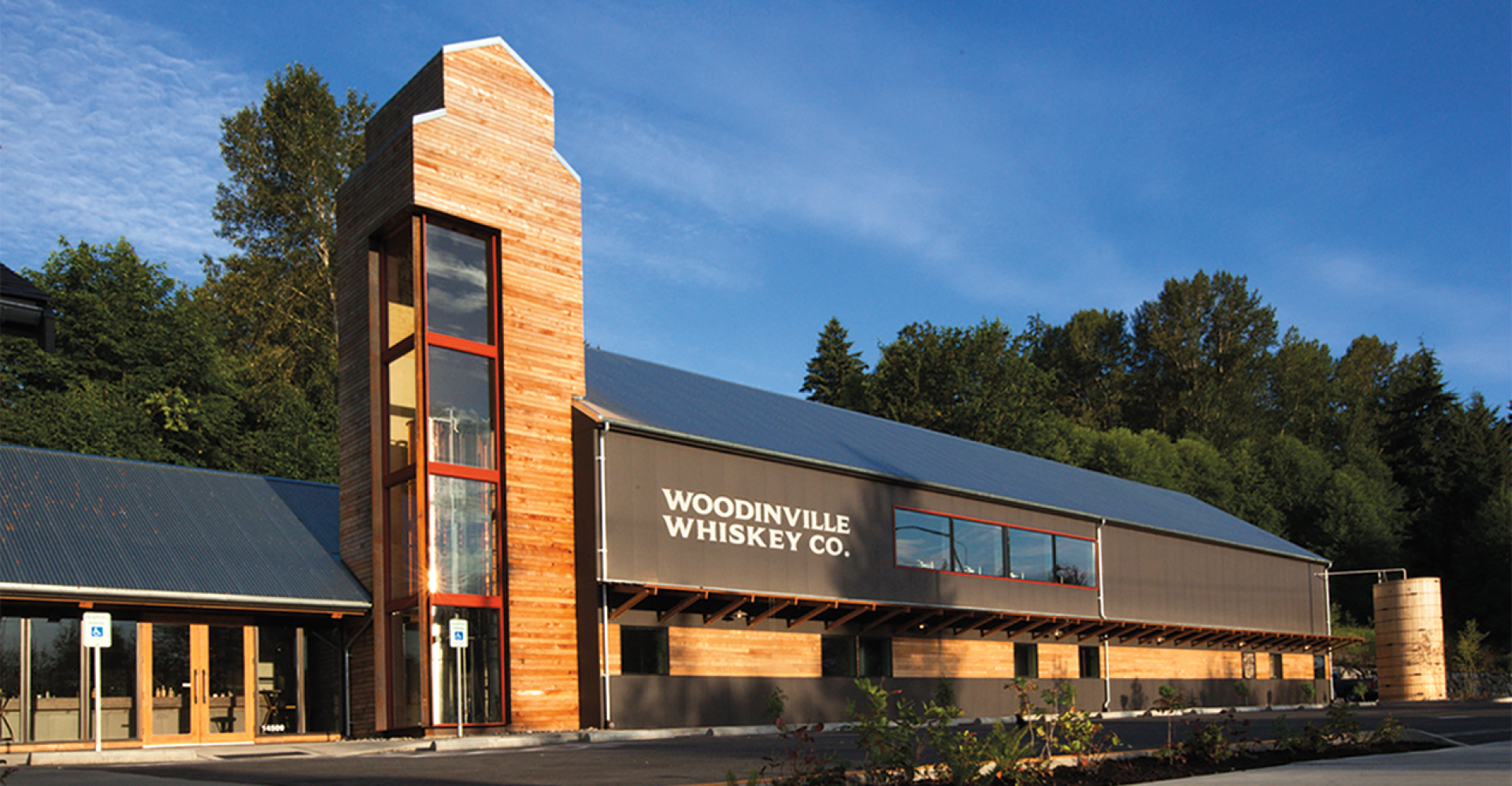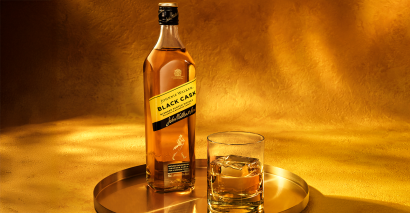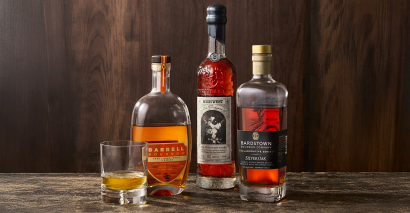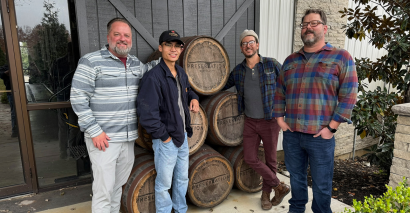
Meetings—in the corporate sense—are a somewhat new addition to the workday for Woodinville whiskey co-founder Brett Carlile. Woodinville was acquired by Moët Hennessy (LVMH) in 2017, a move that allowed the Washington state distiller to ramp up volume and expand beyond its home state. A lot has changed in the nearly seven years since that deal was struck, including Carlile’s role. “Prior to the acquisition, I was very hands-on, literally on the distilling floor working the shifts alongside the other distillers,” he says. Now, Carlile is in charge of all production at Woodinville and was also involved in a post-acquisition expansion of the facility. In Quincy, Washington, east and over the Cascade Mountains from Woodinville, the company built a barreling and bottling facility in 2020, which Carlile oversees as well.
A bigger, more cultural change has also come into play. “I’m more involved in meetings than I used to be,” Carlile says. “Before, my meetings consisted of [co-founder] Orlin [Sorensen] and I driving to go fishing somewhere or enjoying a whiskey after work while discussing business. But obviously with LVMH being headquartered in Paris and Moët Hennessy USA in New York, there's the need for more collaborative meetings to keep everybody in the loop.”
Carlile’s experience isn’t unusual. Craft distillers who’ve sold to large conglomerates—and there have been many such transactions in recent years—face new procedures and requirements but also enjoy the benefits that a larger company with plentiful resources can bring. Many of these distillers have expanded and transformed with the injection of new capital and increased expertise in all facets of whisky making that came with making the deal.
Heady Days of Craft Deals
When Woodinville was acquired, it was a heady time for the craft spirits business, as the scene had reached that magical crossroads between novelty and success. Craft whiskey was a new landscape and the buzzword of nearly every whisky conversation. The major spirits companies, having seen the negative impact of craft brewing on the image of big brewers, were determined not to let it happen to them. They began to take action, first and foremost by pointing to the quality involved in making their own legacy brands. They doubled down on featuring smaller, limited edition releases—and then started making selective acquisitions of the craft brands themselves. In fairly rapid-fire fashion, some of the better-known craft players formed partnerships or were acquired outright—including names like High West, Woodinville, Smooth Ambler, and others.
Constellation Brands was particularly active, having purchased Utah’s High West Distilling in 2016. That same year, the company also acquired a minority stake in Tennessee’s Nelson’s Green Brier, then expanded to a majority stake in 2019. Constellation also bought a minority stake in Virginia’s Catoctin Creek Distilling Co., though that one was sold back to Catoctin in late 2023. Among other craft deals, Constellation also acquired Copper & Kings in 2020 and Austin Cocktails in 2022. And in addition to its deal for Woodinville, Moët Hennessy acquired a minority stake in Vermont-based craft player WhistlePig.
Toward National Expansion
Pernod Ricard has also been highly active on the craft front. The company’s craft distiller purchases over the past decade have included West Virginia’s Smooth Ambler; Kentucky’s Rabbit Hole Distillery; Texas distiller Firestone & Robertson; Castle Brands, the parent company of Jefferson’s Bourbon; and others. Heaven Hill Brands made a splash in 2022 when it snapped up Samson & Surrey. Diageo is also in the mix—its most high-profile craft distiller purchase happened in 2022 when it acquired Texas whiskey company Balcones Distilling. That same year, Campari purchased Kentucky’s Wilderness Trail Distillery.
Before it was purchased by Pernod Ricard in 2019, Jefferson’s Bourbon had an already robust distribution footprint. The acquisition, however, gave the brand an additional boost, according to founder Trey Zoeller. “We were in all 50 states prior to the acquisition; however, we’re much denser now,” he says. “Our points of distribution have increased significantly, as has velocity. With many more feet on the street and such a powerful portfolio, we seem to get more attention from our distributors.”
Having a new corporate owner allowed Jefferson’s to make some portfolio shifts. “We’ve consolidated our portfolio to give a more consistent offering of Jefferson’s expressions, allowing what was once an annual release to be an everyday product,” Zoeller says. “Which means that we also cut some products. That being said, we launched two big innovations (last year) with our Marian McLain and Tropics expressions. We will continue to launch new products every year as well as launch several distillery-only products once we have the new distillery up and rolling.” A $250 million investment over five years by Pernod Ricard, that new distillery will be a state-of-the-art, carbon-neutral facility, with related aging warehouses in Marion County, Kentucky. The investment also includes the building of a visitor center. Zoeller says the facility, which is anticipated to produce 115,00 barrels and 7.5 million proof gallons a year is slated to open this fall.
Meanwhile, Greg Lehman, founder and CEO of Watershed Distillery in Ohio, had a much smaller footprint when he sold his operation to New Jersey-based Marussia Beverages last year. “When I started the business, the idea was to make some products and sell them in Columbus, Ohio, and then maybe in Cleveland or Cincinnati,” Lehman says. “As we grew, it came with fun and successes but also challenges. So when Marussia came along, it was a great way to overcome some of those barriers. A small craft distiller trying to break into 50 states alone is a big task to undertake.”
Lehman says the Marussia deal was “a huge win for us because they have distribution in 50 states and they have money to expand our production.” At the time of the purchase, Watershed brands had limited distribution in five states. With Marussia backing, Lehman expects a “methodical” ramp-up to new markets. “In 2024 we'll probably be in that three-to-five range of markets that we open,” he says. “We’re not going to go crazy with it. We're going to try to make sure we're supporting what we're opening.”
Craft Keeps On Coming
Meanwhile, the craft spirits movement overall has kept on coming, acquisitions or not. A recent study on U.S. craft spirits by the American Craft Spirits Association (ACSA) showed that there are now 2,753 craft spirits distilleries in the United States, with a “craft” distillery defined as one producing fewer than 750,00 proof gallons. Those account for nearly 8% of the value of the U.S. spirits market, and their combined volume is now above 14 million cases, a fairly sizeable chunk of the total spirits market. Within those totals, some 43 craft distillers account for more than half the category volume at 7.6 million cases. So there is a clear delineation in terms of scale. Indeed, for those larger craft players, the word “craft” has gradually been going away, and really falling out of fashion. All told, it’s been quite a ride, especially considering there were only around 100 distilleries in the U.S. back in 2008.
MAJOR RECENT CRAFT SPIRITS ACQUISITION TIMELINE
December 2010: Stranahan’s Colorado Whiskey is acquired by Proximo
January 2014: Hood River Distillers acquires Clear Creek
January 2015: Luxco, Inc. purchases a 50% stake in Limestone Branch Distillery
March 2015: Angel's Envy is sold to Bacardi, Ltd.
Mid-2015: Sazerac takes minority stake in Witherspoon Distillery (now Bendt)
October 2016: Constellation Brands purchases Utah-based High West Distillery
December 2016: Pernod Ricard purchases West Virginia's Smooth Ambler
January 2017: Remy-Cointreau finalizes deal to acquire Washington’s Westland Distillery
January 2017: Constellation purchases a minority stake in Catoctin Creek Distilling Co. Catoctin Creek purchased its shares back in October 2023
January 2017: SPI Group purchases Kentucky Owl
April 2017: William Grant fully acquires Tuthilltown Spirits, after having originally purchased the distillery's Hudson Whiskey brand in 2010
July 2017: Moet Hennessy purchases Woodinville Whiskey Co.
August 2017: Deutsch Family Wine & Spirits acquires Masterson's Rye and Bib & Tucker bourbon
November 2017: Yellow Rose Distilling sells equity stake to Spain's Zamora Co.
September 2018: Through Distill Ventures, Diageo invests in Westward Whiskey
February 2019: Black Button minority stake is sold to Constellation Brands
May 2019: Constellation purchases Nashville’s Nelson’s Green Brier Distillery after having purchased a minority stake in 2016
June 2019: Pernod Ricard acquires a majority stake of Rabbit Hole Distillery in Louisville
August 2019: Firestone & Robertson seels to Pernod Ricard USA
August 2019: Pernod Ricard purchases Castle Brands in a deal that includes Jefferson’s Bourbon.
September 2020: Constellation Brands acquires Kentucky’s Copper & Kings
December 2020: WhistlePig minority stake is sold to Moet Hennessy
April 2021: MGP acquires Luxco, Inc.
February 2022: Heaven Hill Brands acquires Samson & Surrey, whose portfolio includes Bluecoat Gin, Few Spirits, Vago mezcal, Tequila Ocho, and Widow Jane
April 2022: Constellation Brands acquires Austin Cocktails, after having purchased a minority stake in 2018
October 2022: Campari purchases Kentucky’s Wilderness Trail
November 2022: Diageo acquires Balcones Distilling of Waco, Texas
April 2023: Edrington takes majority stake of Wyoming Whiskey, after acquiring a minority stake in 2018
May 2023: MGP buys Penelope Bourbon
August 2023: Marussia Beverages USA acquires Columbus, Ohio-based Watershed Distillery
August 2023: Molson Coors Beverage Company acquires Georgetown, Kentucky-based Blue Run Spirits
September 2023: Ilva Saronno acquires Maryland's Sagamore Spirit




